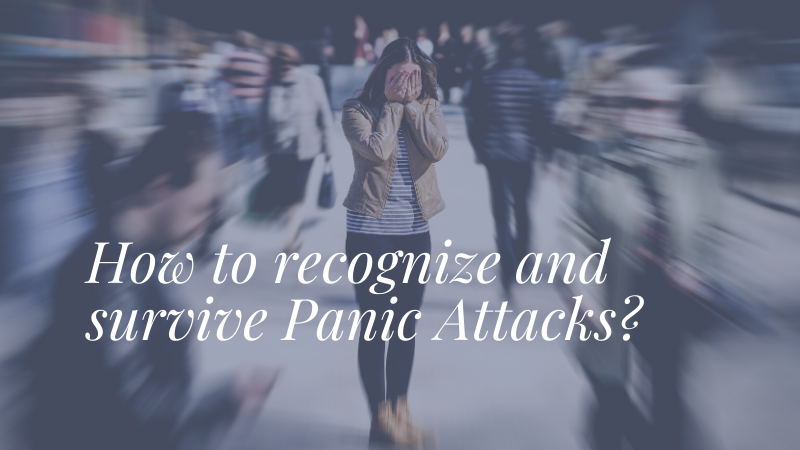Panic attacks are considered a very abrupt or sudden occurrence of discomfort or even fear. They can last 5 to half an hour, and they contain a variety of different symptoms during the event. Some individuals have had what is considered a limited-symptom panic attack. Which is somewhat similar but includes a smaller number of symptoms in the attack. This may be more like what the average person experiences and beliefs to be a panic attack. But it is possible you do not have a panic attack at all, but simply high-level anxiety.
High-level anxiety can occur with things like an uncomfortable feeling in your stomach or a racing heartbeat. But these feelings are not as strong as they are in an individual having a panic attack. They are also not as long-lasting because they may occur for only a few seconds or a few minutes before abating. In a full-blown panic attack, these feelings can last much longer. The intensity of the feelings is very strong, which is why it’s important to get treatment.
Symptoms Of Panic Attacks
There are a large number of symptoms that go along with panic attacks. These attacks can be made up of any combination of four or more of them. A limited-symptom panic attack may contain a smaller number of symptoms. But keep in mind that a true panic attack is strong in intensity and lasts for several minutes. Anything lower than this is not considered a panic attack, but you may still want to speak with your doctor or another medical professional to find out more about what it is and why it’s happening.
Furthermore, heart palpitations are one of the first symptoms of a panic attack. And can feel like a pounding or racing heartbeat. This is one of the more common symptoms for those with increased anxiety or any form of a panic attack. There may also be feelings of chest pain or another discomfort in the stomach area or a feeling of knots in the stomach and chest. You may even feel nauseous or ill.
Sweating, shaking, dizziness and even chills or overheating are also symptoms that you should watch out for. Feelings of parathesia, which manifests as a tingling sensation or a feeling of losing touch with reality or depersonalization can also be signs of an attack.
However, feeling like you are choking, shortness of breath, or even smothering or feeling lightheaded or faint are other serious symptoms. But some individuals even feel like they are losing control or completely going crazy or even that they are going to die. Although, with any of these symptoms, it’s important to seek out professional help to find out what’s going on and work on treatment.
Emergency and panic attackS
An individual who has panic attacks frequently may have a history of frequent visits to the emergency room with a variety of different problems including heart disease, heart attacks, breathing problems, thyroid problems, and much more because the symptoms can feel like a range of other disorders.
The attacks may occur when you feel anxious, nervous, or stressed or they may occur when you are feeling completely calm and relaxed.
How to handle a panic attackS
It’s important not to let your fear of panic attacks control you.
However, panic attacks always pass and the symptoms are not a sign of anything harmful happening. Tell yourself that anxiety is causing the symptoms you’re experiencing.
Ride out the attack. Try to keep doing things. If possible, don’t leave the situation until the anxiety has subsided.
Confront your fear. Because, if you don’t run away from it, you’re giving yourself a chance to discover that the thing that you are fearful of happening is very unlikely to happen or be as bad as your anxiety predicts it will be.
As the anxiety begins to pass, start to focus on your surroundings. And continue to do what you were doing before. Remind yourself, the thing you panicked would happen didn’t happen. Or wasn’t as bad as you thought it would be.
If you’re having a short, sudden panic attack, it can be helpful to have someone with you. They can reassure you that it will pass and the symptoms are nothing to worry about.
Preventing panic attacks
Moreover, you need to try to work out what stress you might be under that could make your symptoms worse. It’s important not to restrict your movements and daily activities.
Things you can do:
- Doing breathing exercises every day will help to prevent panic attacks. It will also help to relieve them when they are happening.
- Regular exercise helps to manage stress levels, release tension, improve your mood and boost confidence.
- Eat regular meals to stabilise your blood sugar levels.
- Avoid caffeine, alcohol and smoking – these can make panic attacks worse.
- Panic support groups have useful advice about how you can manage your attacks. Knowing that other people are experiencing the same feelings can be reassuring.
- Psychological therapies like Cognitive behavioural therapy (CBT) can identify and change the negative thought patterns. It’s these thought patterns that are feeding your panic attacks.

